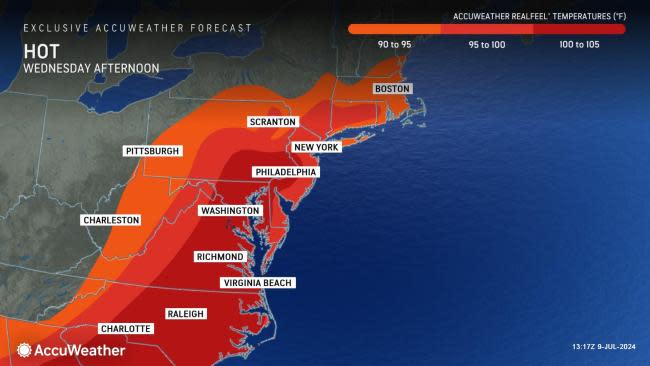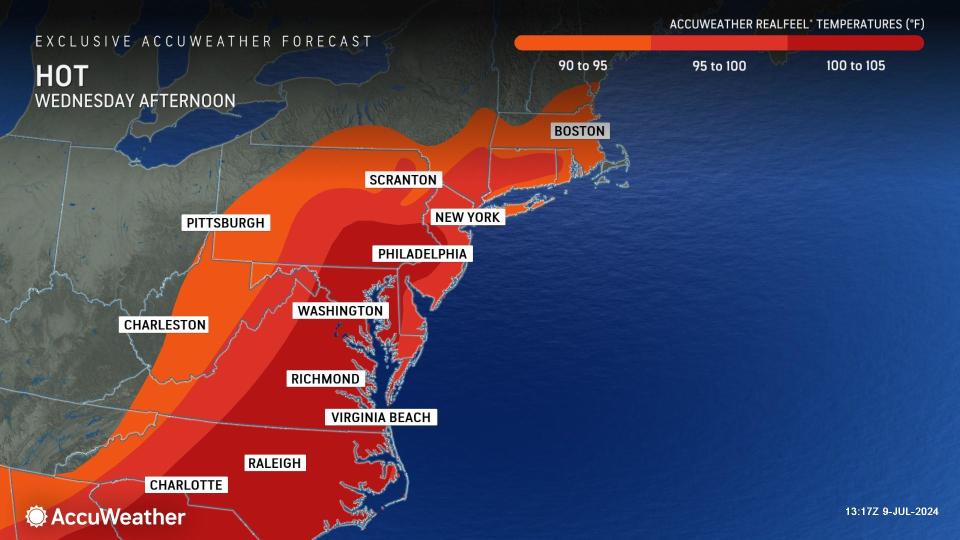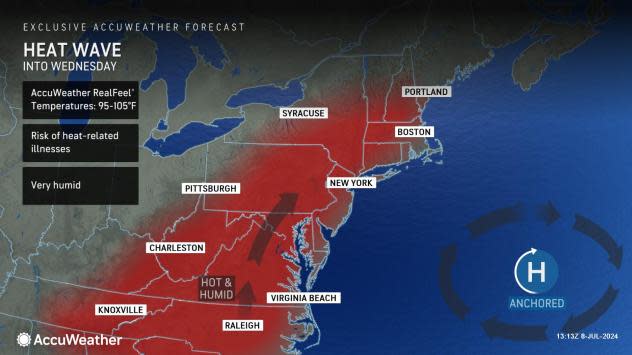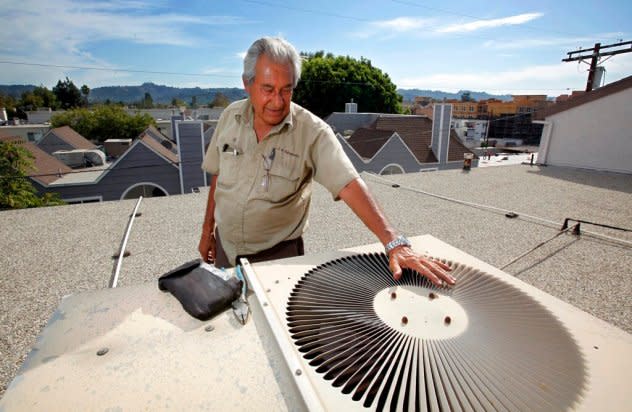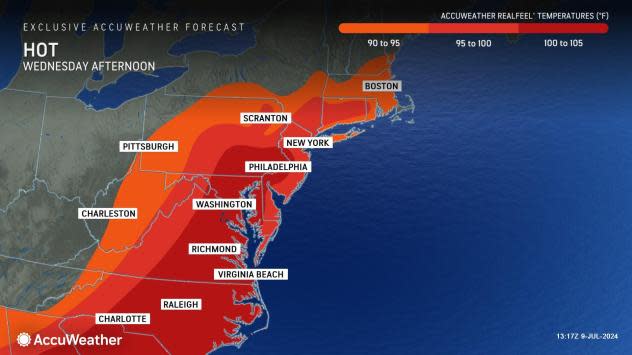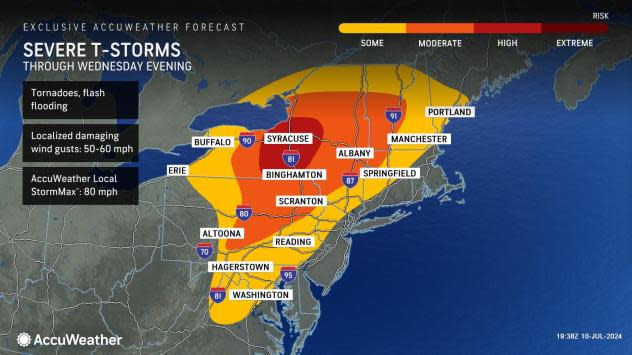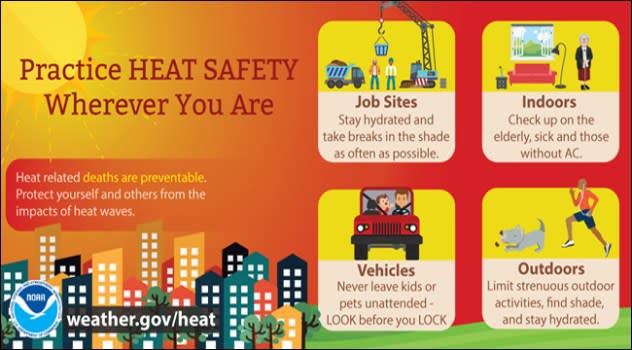Eastern US to experience dangerous combination of extreme heat, humidity
Even though the next three weeks typically bring the highest temperatures of the year for much of the Northeast, the ongoing heat can be dangerous for some individuals, especially when the air becomes very humid, AccuWeather meteorologists caution.
It is considered a heat wave for much of the Northeast when the temperature hits 90 degrees for three or more days.
How humid the air is when it gets hot can be a game changer as far as tolerance and safety is concerned. Unlike that of the southwestern United States where the air is usually very dry, humid air often goes along with hot weather in the Eastern states. The heavy air will stick around through the week while temperatures peak into Wednesday.
 |
Widespread highs in the 90s are in store for most areas east of the Appalachians, but even some of the valleys in the mountain range will approach or exceed 90. Along the Interstate 95 corridor, actual temperatures will come close to the 100-degree mark in cities such as Washington, D.C., Baltimore and Richmond, Virginia. Because this is typically the hottest time of the year, few daily record highs are likely to be set.
Even in Philadelphia with a high in the mid-90s, and New York City and Boston with a high near 90, the heat will feel more intense when factoring in the sun's rays in mid-July, only a few weeks past the summer solstice. New York City's Central Park thermometer reached 95 on Monday, which was the highest temperature of the year so far.
 |
Even though the air coming out is pretty warm, Al Manzano, founder of A&M Refrigeration Co., cools his hand on the vent fan outlet on an air conditioning unit on the roof of an apartment building in the North Hollywood district of Los Angeles Tuesday, Sept. 28, 2010. (AP Photo/Reed Saxon) |
The linchpin in all cases will be the high humidity. Meteorologists look at the dew point temperature to determine just how humid the air may feel to most individuals. The dew point is the temperature when the air will be saturated to 100% humidity, if it could be cooled down that much. When dew point temperatures hit 70 along I-95, for example, that is a humid day by most people's standards.
However, through midweek and Thursday in some cases, dew point temperatures will climb well into the 70s and will top 80 in some areas of the mid-Atlantic. The more humid the air is, the more difficult it is for the body to regulate its core temperature, as the natural cooling mechanism -- the evaporation of perspiration -- is less effective.
With the combination of the heat, high humidity, intense mid-July sunshine, and other factors, the AccuWeather RealFeel® Temperatures will climb into the 100s from southeastern Pennsylvania and portions of New Jersey to the Carolinas, as well as portions of the Ohio and Tennessee valleys. AccuWeather RealFeel® Temperatures will climb well into the 90s to near 100 in southern New England.
 |
"Little to no relief from the heat and humidity will continue through the overnight hours, adding stress to power grids and making it very uncomfortable for those without air conditioning," said AccuWeather Meteorologist Brandon Buckingham.
By the time the urban areas begin to cool off at night, the sun is already rising and applying heat for the new day.
The pattern will not be without some thunderstorms.
"The heat and humidity will help fuel severe thunderstorms and even tornadoes into Wednesday evening as tropical moisture from Beryl sweeps into the region from the Midwest," Buckingham said.
 |
Additional showers and thunderstorms are forecast to erupt along much of the Atlantic Seaboard from Thursday to Friday. As the downpours occur, humidity levels will remain very high, but temperatures will trend lower. Enough rain may even fall to lead to flash flooding in urban areas. Any downpours that occur will help the building drought in some areas and quell the wildfire risk.
For those who must work outdoors in the heat, experts strongly advise remaining hydrated, wearing lightweight, light-colored clothing, and taking breaks in the shade or air conditioning. If possible strenuous work or exercise should be done early in the morning or in the evening, when the sun is not so much of a factor.
 |
Practice heat safety, wherever you are! |
The best bets to cool off will be at a public pool or the beach, but even a quick, cool shower can work wonders.
Want next-level safety, ad-free? Unlock advanced, hyperlocal severe weather alerts when you subscribe to Premium+ on the AccuWeather app. AccuWeather Alerts™ are prompted by our expert meteorologists who monitor and analyze dangerous weather risks 24/7 to keep you and your family safer.

 Yahoo News
Yahoo News 